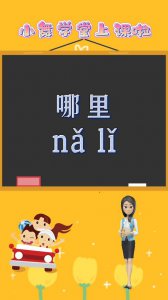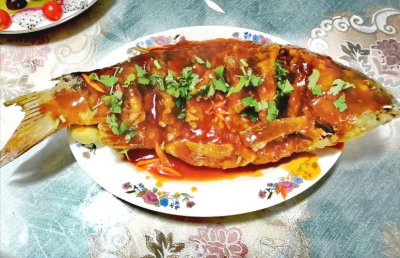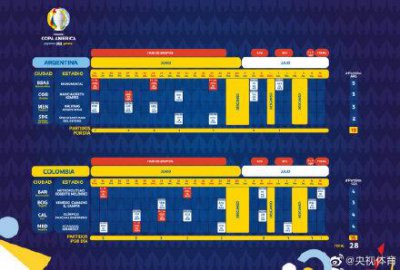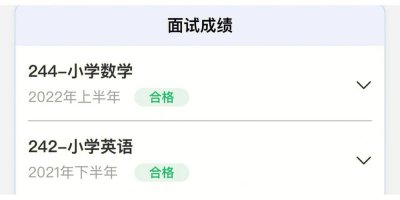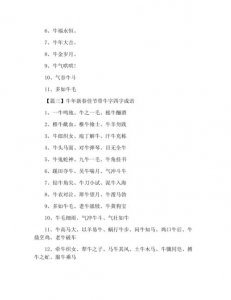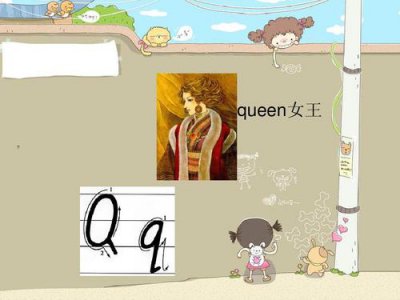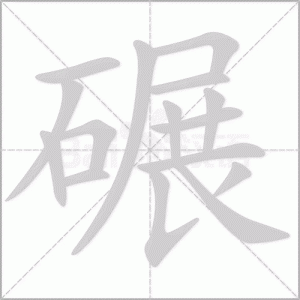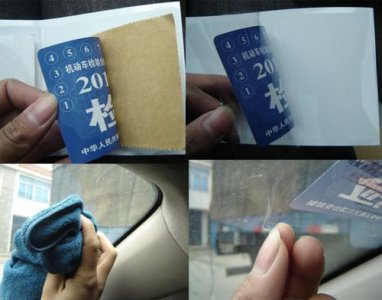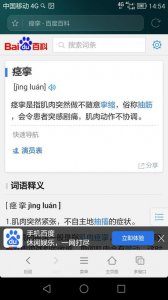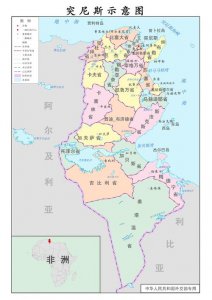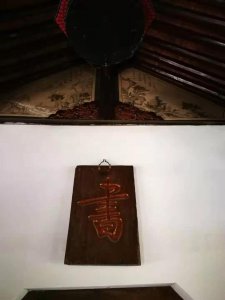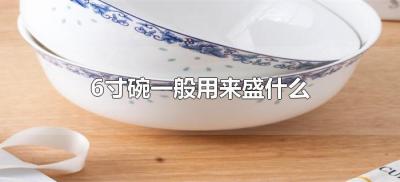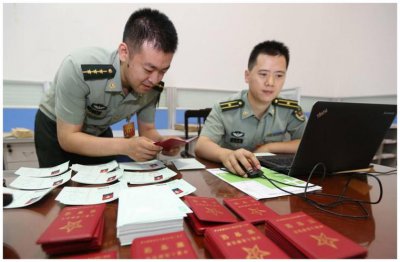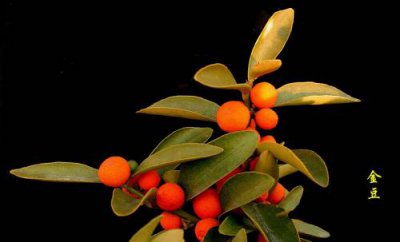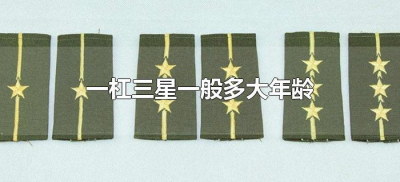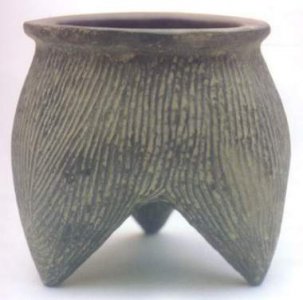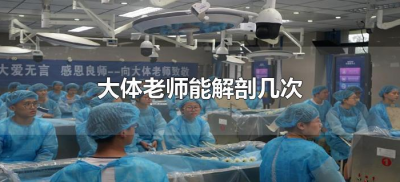春节的由来英文,春节的由来英文介绍带翻译简短
春节的由来英文,春节的由来英文介绍带翻译简短
本文目录
1.春节的由来英文介绍带翻译简短 2.教师节的由来英语版及中文翻译 3.春节的来历英文版简短 手抄报 4.春节的由来英语介绍
春节的由来英文介绍带翻译简短
春节 的由来英文介绍带翻译有哪些?春节挂贴 年画 在城乡也很普遍,浓黑重彩的年画给千家万户平添了许多兴旺欢乐的喜庆气氛。一起来看看春节的由来英文介绍带翻译,欢迎查阅!
目录
春节的来源英文介绍
介绍中国传统春节年俗的英语
春节习俗英文简介
春节的来源英文介绍
Spring Festival is the most important holiday for Chinese people. Excitement and happiness are palpable this time of the year, and they reach the peak on lunar new year‘s eve.
春节对于中国人来说是最重要的节日。在每年的春节都让人兴高采烈,尤其是大年三十那晚,更是达到了高潮。
Though the 15-day period, which starts with the first day of the lunar new year and ends on the 15th day (known as Lantern Festival), is relatively long, it is the busiest time of the year for Chinese people. The arrangements they have to make for family reunions, buying necessities and preparing food keeps them busy throughout the holiday. Many of them travel back home and meet friends over dinner and drinks. The celebrations include decorating the house and setting off fireworks.
春节历时15天,也就从大年初一开始,到元月十五 元宵节 结束。这段比较长的时间是中国人最忙的时候。他们为家庭聚会作安排,采购年货,准备丰盛的食物,以至于整个春节假期都忙忙碌碌的。许多人在春季期间都要回老家过年,跟朋友碰碰头,聚个餐。庆祝春节也包括大扫除和放烟火。
But we are talking about a tradition that seems to be fading.
但是我们现在要谈的是越来越淡的年味。
Spring Festival, as it is celebrated today, has undergone many changes, thanks to the country‘s economic development and globalization.
现在的春节已经因为我国经济的发展和全球化的影响而改变了很多。
Yet no Spring Festival is complete without food. People could not get good food whenever they desired in earlier times, something that does not apply to society today. More often than not, people faced the risk of famine. The best time for people to celebrate was when food was available in plenty, and that was possible in spring, or the beginning of the lunar new year. That was the main reason why Spring Festival acquired such great importance among Chinese people.
但是没有哪个春节是完全离得开“吃”的。从前,不论人们提前多久想要买年货,总是不能如愿,而现在早已今非昔比。过去常常还要闹饥荒。人们最好的庆祝时间就是他们能得到食物丰盛的时候,也就是春天或是元月初的那段时间。那也是为什么春节对于中国人如此重要的主要原因。
But three decades of economic growth has ensured that people in China, except for those who are still poor, can enjoy a good meal whenever they want. Such has been the change in people‘s fortune that some have to be treated for obesity and other health problems associated with excessive eating.
但是三十年来的经济发展已经让中国人,除了那些仍然穷苦的人以外,随时都能享受美食。这得益于人民财富的增长,但是后者也导致一些人吃得太多而受到肥胖威胁和健康问题。
In the past, celebrations were limited to events like song-and-dance duets in North China, dragon/lion dances in South China and fireworks, which required the joint efforts of the entire community. But economic development and urbanization seems to have weakened the social links among people. Many, especially those living in cities, are not interested in celebrating the festival with people they hardly know.
在过去,庆祝春节还只停留在北方的二人转和南方的舞龙舞狮等形式。那些庆祝活动往往需要许多人合力才能办得起来。但是经济的发展和国际化程度的提升似乎已经将这种社会联系弱化了。许多人,特别是城市居民,不太愿意与不相识的人一起共度春节。
Many customs associated with Spring Festival have changed, too. In the past, people used to visit relatives and friends with gifts and lots of good wishes. Today, many people, especially the youth, use their cell phones or the Internet to send their good wishes and even "gifts" to their relatives and friends. Some may say this a sign that people have become less caring about their near and dear ones, but we should see this development as a time- and energy-saving exercise granted by the information age.
与春节相关的许多习俗也被改变了。在过去,人们常常会带着礼物走亲访友,互道祝福。今天许多人,特别是年轻人,用手机或是网络向亲朋好友发去“礼物”和祝福。有些人或许会说,这说明人们已经没有那么关心至爱亲朋了,但是我们应该把这种变化看作信息化时代省钱省力的好办法。
In recent times, many people have started praying for a career promotion or more money instead of invoking God or the Buddha for a healthy and long life and the welfare of their family. But the number of such people is decreasing now, which shows that people are becoming more reasonable.
最近几年,许多人开始祈祷事业高升,财源滚滚,而不是求神拜佛,他们身体健康,长命百岁,家庭美满。但是这样的人数现在正在减少,说明人们开始变得更加理性。
<<<
介绍中国传统春节年俗的英语
Spring Festival is the most important holiday for Chinese people. Excitement and happiness are palpable this time of the year, and they reach the peak on lunar new year‘s eve.
春节对于中国人来说是最重要的节日。在每年的春节都让人兴高采烈,尤其是大年三十那晚,更是达到了高潮。
Though the 15-day period, which starts with the first day of the lunar new year and ends on the 15th day (known as Lantern Festival), is relatively long, it is the busiest time of the year for Chinese people. The arrangements they have to make for family reunions, buying necessities and preparing food keeps them busy throughout the holiday. Many of them travel back home and meet friends over dinner and drinks. The celebrations include decorating the house and setting off fireworks.
春节历时15天,也就从大年初一开始,到元月十五元宵节结束。这段比较长的时间是中国人最忙的时候。他们为家庭聚会作安排,采购年货,准备丰盛的食物,以至于整个春节假期都忙忙碌碌的。许多人在春季期间都要回老家过年,跟朋友碰碰头,聚个餐。庆祝春节也包括大扫除和放烟火。
But we are talking about a tradition that seems to be fading.
但是我们现在要谈的是越来越淡的年味。
Spring Festival, as it is celebrated today, has undergone many changes, thanks to the country‘s economic development and globalization.
现在的春节已经因为我国经济的发展和全球化的影响而改变了很多。
Yet no Spring Festival is complete without food. People could not get good food whenever they desired in earlier times, something that does not apply to society today. More often than not, people faced the risk of famine. The best time for people to celebrate was when food was available in plenty, and that was possible in spring, or the beginning of the lunar new year. That was the main reason why Spring Festival acquired such great importance among Chinese people.
但是没有哪个春节是完全离得开“吃”的。从前,不论人们提前多久想要买年货,总是不能如愿,而现在早已今非昔比。过去常常还要闹饥荒。人们的庆祝时间就是他们能得到食物丰盛的时候,也就是春天或是元月初的那段时间。那也是为什么春节对于中国人如此重要的主要原因。
But three decades of economic growth has ensured that people in China, except for those who are still poor, can enjoy a good meal whenever they want. Such has been the change in people‘s fortune that some have to be treated for obesity and other health problems associated with excessive eating.
但是三十年来的经济发展已经让中国人,除了那些仍然穷苦的人以外,随时都能享受美食。这得益于人民财富的增长,但是后者也导致一些人吃得太多而受到肥胖威胁和健康问题。
In the past, celebrations were limited to events like song-and-dance duets in North China, dragon/lion dances in South China and fireworks, which required the joint efforts of the entire community. But economic development and urbanization seems to have weakened the social links among people. Many, especially those living in cities, are not interested in celebrating the festival with people they hardly know.
在过去,庆祝春节还只停留在北方的二人转和南方的舞龙舞狮等形式。那些庆祝活动往往需要许多人合力才能办得起来。但是经济的发展和国际化程度的提升似乎已经将这种社会联系弱化了。许多人,特别是城市居民,不太愿意与不相识的人一起共度春节。
Many customs associated with Spring Festival have changed, too. In the past, people used to visit relatives and friends with gifts and lots of good wishes. Today, many people, especially the youth, use their cell phones or the Internet to send their good wishes and even "gifts" to their relatives and friends. Some may say this a sign that people have become less caring about their near and dear ones, but we should see this development as a time- and energy-saving exercise granted by the information age.
与春节相关的许多习俗也被改变了。在过去,人们常常会带着礼物走亲访友,互道祝福。今天许多人,特别是年轻人,用手机或是网络向亲朋好友发去“礼物”和祝福。有些人或许会说,这说明人们已经没有那么关心至爱亲朋了,但是我们应该把这种变化看作信息化时代省钱省力的好办法。
In recent times, many people have started praying for a career promotion or more money instead of invoking God or the Buddha for a healthy and long life and the welfare of their family. But the number of such people is decreasing now, which shows that people are becoming more reasonable.
最近几年,许多人开始祈祷事业高升,财源滚滚,而不是求神拜佛,他们身体健康,长命百岁,家庭美满。但是这样的人数现在正在减少,说明人们开始变得更加理性。
春节习俗英文简介Customs of the Spring Festival
The Spring Festival is a traditional Chinese festival and also the most important one of the whole year. Through the evolvement of thousands of years, a series of customs are spreading far and wide.
扫尘 Sweeping the Dust
“Dust” is homophonic with "chen”(尘)in Chinese, which means old and past. In this way, "sweeping the dust” before the Spring Festival means a thorough cleaning of houses to sweep away bad luck in the past year. This custom shows a good wish of putting away old things to welcome a new life. In a word, just before the Spring Festival comes, every household will give a thorough cleaning to bid farewell to the old year and usher in the new.
贴春联 Pasting Spring Couplets
“The Spring Couplet”, also called "couplet” and "a pair of antithetical phrases”, is a special form of literature in China. The Spring Couplet is composed of two antithetical sentences on both sides of the door and a horizontal scroll bearing an inscription, usually an auspicious phrase, above the gate. The sentence pasting on the right side of the door is called the first line of the couplet and the one on the left the second line. On the eve of the Spring Festival, every household will paste on doors a spring couplet written on red paper to give a happy and prosperous atmosphere of the Festival. In the past, the Chinese usually wrote their own spring couplet with a brush or asked others to do for them, while nowadays, it is common for people to buy the printed spring couplet in the market.
贴窗花和“福”字 Pasting Paper-cuts and "Up-sided Fu”
Paper-cuts, usually with auspicious patterns, give a happy and prosperous atmosphere of the Festival and express the good wishes of Chinese people looking forward to a good life. In addition to pasting paper-cuts on windows, it is common for Chinese to paste the character "fu(福)”, big and small, on walls, doors and doorposts around the houses. "Fu(福)” shows people’s yearning toward a good life. Some people even invert the character "fu(福)” to signify that blessing has arrived because "inverted” is a homonym for "arrive” in Chinese. Now many kinds of paper-cuts and "fu(福)” can be seen in the market before the Festival.
守岁 Staying Up Late on New Year‘s Eve
The tradition of staying up late to see New Year in originated from an interesting folk tale. In ancient China there lived a monster named Year, who was very ferocious. Year always went out from its burrow on New Year’s Eve to devour people. Therefore, on every New Year’s Eve, every household would have supper together. After dinner, no one dared go to sleep and all the family members would sit together, chatting and emboldening each other. Gradually the habit of staying up late on New Year’s Eve is formed. Thus in China, "celebrating the Spring Festival” is also called "passing over the year (guo nian)”。 However, now there are less and less people in cities who will stay up late to see New Year in.
贴年画 Pasting New Year Prints
The custom of pasting New Year Prints originated from the tradition of placing Door Gods on the external doors of houses. With the creation of board carvings, New Year paintings cover a wide range of subjects. The most famous ones are Door Gods, Surplus Year after Year, Three Gods of Blessing, Salary and Longevity, An Abundant Harvest of Crops, Thriving Domestic Animals and Celebrating Spring. Four producing areas of New Year Print are Tɑohuɑwu of Suzhou, Yɑngliuqing of Tianjin, Wuqiɑng of Hebei and Weifang of Shangdong. Now the tradition of pasting New Year paintings is still kept in rural China, while it is seldom followed in cities.
吃饺子 Having Jiaozi
On New Year’s Eve, the whole family will sit together to make jiaozi and celebrate the Spring Festival. The shape of jiaozi is like gold ingot from ancient China. So people eat them and wish for money and treasure. The tradition of having jiaozi is very important during the Spring Festival. You cannot have a complete Spring Festival without having jiaozi. (See page 82 for more information about "jiaozi”)
看春节联欢晚会 The CCTV New Year‘s Gala
The New Year’s Gala is a variety show held by China Central Television (CCTV) since 1983. For every year since then at the turn of the Lunar New Year, the program begins at 8:00PM and lasts five or six hours. It brings laughter to billions of people, creates many popular words and produces lots of TV phenomena meriting attention. For over twenty years, its value has gone far beyond a variety show. It is essential entertainment for the Chinese both at home and abroad. Many Chinese would like to watch the gala while having the dinner on New Year’s Eve.
<<<
春节习俗英文简介
扫尘 Sweeping the Dust
“Dust” is homophonic with "chen”(尘)in Chinese, which means old and past. In this way, "sweeping the dust” before the Spring Festival means a thorough cleaning of houses to sweep away bad luck in the past year. This custom shows a good wish of putting away old things to welcome a new life. In a word, just before the Spring Festival comes, every household will give a thorough cleaning to bid farewell to the old year and usher in the new.
贴春联 Pasting Spring Couplets
“The Spring Couplet”, also called "couplet” and "a pair of antithetical phrases”, is a special form of literature in China. The Spring Couplet is composed of two antithetical sentences on both sides of the door and a horizontal scroll bearing an inscription, usually an auspicious phrase, above the gate. The sentence pasting on the right side of the door is called the first line of the couplet and the one on the left the second line. On the eve of the Spring Festival, every household will paste on doors a spring couplet written on red paper to give a happy and prosperous atmosphere of the Festival. In the past, the Chinese usually wrote their own spring couplet with a brush or asked others to do for them, while nowadays, it is common for people to buy the printed spring couplet in the market.
贴窗花和“福”字 Pasting Paper-cuts and "Up-sided Fu”
Paper-cuts, usually with auspicious patterns, give a happy and prosperous atmosphere of the Festival and express the good wishes of Chinese people looking forward to a good life. In addition to pasting paper-cuts on windows, it is common for Chinese to paste the character "fu(福)”, big and small, on walls, doors and doorposts around the houses. "Fu(福)” shows people’s yearning toward a good life. Some people even invert the character "fu(福)” to signify that blessing has arrived because "inverted” is a homonym for "arrive” in Chinese. Now many kinds of paper-cuts and "fu(福)” can be seen in the market before the Festival.
<<<
春节的由来英文介绍带翻译相关 文章 :
★ 春节的由来英文介绍带翻译
★ 关于春节的来历英语作文加翻译
★ 有关介绍春节习俗的英语作文带翻译
★ 关于介绍春节的英语作文带翻译
★ 关于介绍春节的英语作文及翻译
★ 关于春节的来历与习俗的英语介绍
★ 介绍春节的英语短文带翻译
★ 春节来历英文作文
★ 有关于春节的英语作文带翻译
★ 描写春节来历英语作文范文
var _hmt = _hmt || []; (function() { var hm = document.createElement(“script”); hm.src = “***/hm.js?f3deb3e38843798ce8b6783fc0959c85”; var s = document.getElementsByTagName(“script”)[0]; s.parentNode.insertBefore(hm, s); })();
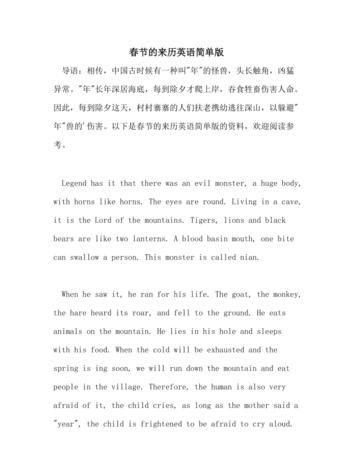
教师节的由来英语版及中文翻译
1.英文版:
There's an old called "years" the monster, head length Angle, fierce anomaly, life in the sea. On New Year's eve will climbed out, the spitting food livestock harm thy soul. So a to New Year's eve, everyone fled to the mountains, to avoid the damage. This year, from the village to a silver whiskers elegant, eye if lang star old yourself. Midnight "years" burst into the village, is preparing to bluster, all of a sudden there was "cracking" Fried noise, the old has put on red appear in front of the "year", "year" shuddered, to flee to the sea, and the night can't into the village. This is to celebrates New Year's eve legends and the origin of firecrackers, and then after thousands of years of development, the Chinese New Year customs to accept the more abundant the.
2.中文版:
以前有个叫“年”的怪物,头长尖角、凶猛异常,生活在海里。在除夕夜会爬上岸,吐食牲畜伤害己命。因此一到除夕夜,大家都逃往深山,以躲避“年”的伤害。这一年,从村中来了一个银须飘逸、目若朗星的老己。半夜“年”闯进村,正准备逞凶时,突然传来“噼噼啪啪”的炸响声,那位老己披上红袍呈现在“年”的面前,“年”浑身战栗,逃回了海里,再夜不敢进村了。这就是过年的传说和爆竹的来历,后来经过几千年的发展,过年的习俗悦来越丰厚了。

拓展资料:
春节源自何时很难考究,不过一般认为起源于中国殷商时期的年头岁末祭神、祭祖活动(腊祭);传说最早在尧舜时就有过春节的风俗。
农历的正月是一年的开始,而正月上旬或中旬,大部分情况正好是春季的开始,节日的时间相信和农业劳作影响有关,甲骨文和金文中的年字都有谷穗成熟的形象。
春节入选中国世界纪录协会中国最大的节日,位居中国三大传统节日春节、端午节、中秋节之首。
春节的来历英文版简短 手抄报
1、英文版:The Spring Festival falls on the 1st day of the 1st lunar month,often one month later than the Gregorian calendar.It originated in the Shang Dynasty (c.1600 BC-c.1100 BC) from the peoples sacrifice to gods and ancestors at the end of an old year and the beginning of a new one.
2、翻译:春节是农历正月初一,通常比公历晚一个月。它起源于商朝(约公元前1600年至公元前1100年),源于人们在元旦末和新的一年初祭祀神和祖先。
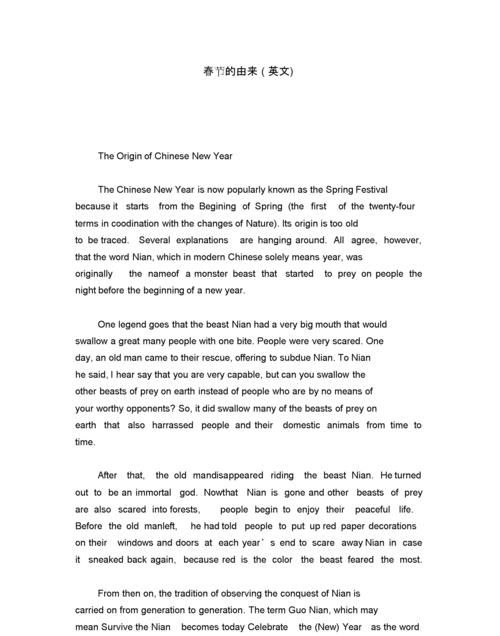
春节的由来英语介绍
春节的由来英语
每逢春节来临,人们就有了一周的休息时间,不管家离得有多远,都会回家过年。你们对春节的来历和习俗有多少的了解吗?以下是由我为大家收集整理的英语春节的由来,欢迎大家学习参考。
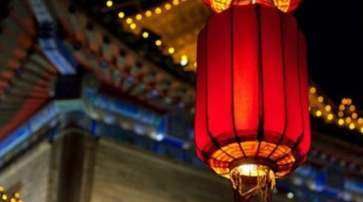
一、春节来历的英文介绍
Origin of the Spring Festival
Spring Festival is the lunar Suishou,is also our ancient traditional festivals.Ancient-off "year"is not in the twelfth lunar month on the 29th or on the 30th,but in the "wax on",that later,"Laba."Southern and Northern Dynasties later,the "wax Festival"to the end of the year.To the Republican era,the switch to Gregorian calendar was only then that the lunar year is called "Spring Festival",because the Spring Festival is generally in the "Spring,"both before and after.
翻译:春节,是农历的岁首,也是我国古老的传统节日.古代过“年”不是在腊月二十九日或三十日,而是在“蜡日”,即后来的“腊八”.南北朝以后,把“蜡祭”移至岁末.到了民国时 ,改用阳历,才把阴历年叫“春节”,因为春节一般都在“立春”前后。
Spring Festival is China's biggest and most exciting festival of an ancient tradition.Commonly known as "Chinese New Year."According to China's Lunar New Year,the first month who started in ancient times known Mongol Yuan Chen,Yuan-cheng,Yuan Shuo,New Year's Day and so on,commonly known as New Year's Day,as well as the previous day,moving in,three new moon,three North Korea,the three began,ternary,etc.Do not say,which means the first month who started this is the year,month,day three start.
翻译:春节是我国最盛大、最热闹的一个古老传统节日。俗称“过年”。按照我国农历,正月初一古称元日、元辰、元正、元朔、元旦等,俗称年初一,还有上日、正朝、三朔、三朝、三始、三元等别称,意即正月初一是年、月、日三者的开始。
Chinese New Year,by definition is a spring festival.Spring,Vientiane update,a new round of sowing and harvesting season is beginning.People have every reason to dancing and singing to welcome the holiday.Thus,before the Spring Festival red paper pasted on the door face,yellow-word New Year's Message.
翻译:春节,顾名思义就是春天的节日。春天来临,万象更新,新一轮播种和收获季节又要开始。人们有足够的理由载歌载舞来迎接这个节日。于是,节前就在门脸上贴上红纸黄字的新年寄语。
The another name is called the Spring Festival Chinese New Year."Year"what is it?Is a kind of bad luck for people's imagination in animals."Year"the one.Trees pride had Baicao no life;"year"one"off"and,all things grow,flowers everywhere."Year"How can the past?You need to use whip shelled,so have the custom of burning firecrackers.In 1993,the Beijing Municipal People's Government promulgated a law to ban fireworks,so that this continuity throughout the ages for centuries the custom of the past.
翻译:春节的另一名称叫过年。“年”是什么呢?是一种为人们带来坏运气的想象中的动物。“年”一来。树木凋蔽,百草不生;“年”一“过”,万物生长,鲜花遍地。“年”如何才能过去呢?需用鞭炮轰,于是有了燃鞭炮的习俗。1993年,北京市人民政府颁布了禁放烟花爆竹的法律,使这一沿续了几百年的习俗成为历史。
Spring Festival is a family reunion holiday,which is very similar to Christmas in the West.Away from home when the children returned to their parents at home to travel long distances.Real the night before Chinese New Year is called "New Year's Eve",also known as "Reunion Night","group years."From the traditional New Year's Eve celebrations continued until the fifteenth day Lantern Festival.Festive atmosphere,to last a month.Holiday movies before Jizao,worship of ancestors,to eliminate contamination.To be posted on the 30th Door God,couplets,flag,eating dumplings,fireworks,New Year's Eve,"Shou Sui"and other ceremonies; younger generation who started their elders to pay the first month,and then to the New Year with relatives and friends.When he met friends and relatives for the first time.Say,"congratulated the new hi","Kung Hei Fat Choi","Congratulations,""Happy New Year"and then congratulated each other.
翻译:春节是个亲人团聚的节日,这一点和西方的圣诞节很相似。离家的孩子这时要不远千里回到父母家里。真正过年的前一夜叫“除夕”,又叫“团圆夜”,“团年”。传统的庆祝活动则从除夕一直持续到正月十五元宵节。喜庆气氛要持续一个月。正月初一前有祭灶、祭祖、扫除污秽。三十日要贴门神、对联、挂旗、吃饺子、放鞭炮,除夕“守岁”等仪式;正月初一晚辈向长辈拜年,然后至亲友家贺年。亲友第一次见面时,说些“恭贺新喜”、“恭喜发财”、“恭喜”、“过年好”等话,互相祝贺。
December 23,1949,the PRC Central People's Government provides for an annual Lunar New Year holiday 3 days.Chinese New Year-China the public is most solemn,the most lively of an ancient traditional festivals.
翻译:1949年12月23日,中华人民共和国中央人民政府规定每年春节放假3天。春节——我国民间最隆重、最热闹的一个古老传统节日。
二、春节习俗的英文介绍
A series of colorful celebration activities begin on the first day of thefirst lunar month.
从农历正月初一开始的节庆活动可谓丰富多彩,多种多样。
After the Spring Festival, all kinds of entertainment programs used to be given in the rural areas in China.Just like the flower exhibition in Beijing now, the entertainment programs include walking on stilts, taking a boat on ground and operas.
春节过了以后,就是在过去中国的农村里边,文艺的活动逐渐地展开了,有各种的文艺节目,像我们现在看到的北京花会一样,高跷、旱船,另外就是唱戏。
No matter in the city or in the countryside, all the people will do one thingthat is to extend Spring Festival greetings. This activity begins at firstbetween family members.
不管是城里人,还是在农村,人们都要做的一件事就是拜年。民间流行的’拜年活动先是从家里开始的。
What does the holiday mean?
这个节日有什么含义吗?
The term "pass year" is used for the Spring Festival (Chinese New Year). The word "Year" in Chinese characters used to mean a horrible beast. To combat the beast, the Chinese hang "good luck" wishes on red paper on the door and use fireworks in the belief that the beast fears red and fire. This tradition in many ways resemblethe Western belief of using garlic and crosses to fight vampires.
中文中“过年”这个词组用以表示对春节(中国新年)的庆祝。“年”这个字在中文里是一种恐怖的怪兽。因为“年”害怕红色和火,所以中国人会在门上悬挂“春联”写上美好祝福,并放鞭炮来赶跑它。这个传统有点类似西方人用大蒜和十字架吓跑吸血鬼的传统。
Why New Year is so special?
为什么新年那么特别呢?
The Chinese zodiac features 12 animals in the sequence of Rat, Ox, Tiger, Rabbit, Dragon, Snake, Horse, Sheep, Monkey, Rooster, Dog, and Pig. This year is the year of Tiger. Each animal represents a different "personality". According to legend, people held a conference with all the animals, informing them that they would pick the 12 to represent the zodiac. However, in spite of being fast, the cat was not picked as its then-close friend, the rat, did not wake it. This action sparked off a rivalrythat continues till this day.
中国的十二生肖代表了十二种动物,他们的顺序是:鼠、牛、兔、龙、蛇、马、羊、猴、鸡、狗和猪。今年是虎年。每一种动物有他们自己的“性格”。根据传说,人们当初和动物们开了一个会,最先到会的动物们就可以进入十二生肖。而身为猫最好的朋友,老鼠却没有把猫叫醒去开会。因此,它们之间的战争一直持续到今天。
What do people do?
那人们在新年都干啥呢?
Eat, eat again, and then eat some more! As the old Chinese saying goes: food is everything.
吃、接着吃、再吃更多东西!就跟一句中国古话说的那样:食物即一切。
The tradition is to have different main courses everyday from the 1st day of the New Year to the 15th day of the New Year, from Jiao Zi (dumplings), noodles, spring rolls, sticky rice cakes, and Tang Yuan (stuffed rice balls). Besides culinarysatisfaction, each food has a meaning as well: for instance, Jiao Zi looks like gold, implying a wealthy year ahead.
传统就是,从新年第一天开始直到正月十五,每天都要吃不同的主菜。从饺子、面条、春卷、年糕到汤圆。除了祭好五脏庙以外,每一种食物也有含义:比如饺子看起来就像金元宝,这意味来年的丰衣足食。
Besides eating, young people visit older family members and kids are blessed with a red pack of "lucky" money. And then, people gather and eat again (!), leading to a lot of advertisements about fitness right after the Chinese New Year holiday.
除了吃以外,年轻人要去拜会家里的老人家,而小盆友们就有大把压岁钱拿。跟着,人们又聚在一起吃,所以节后中国就会出现很多减肥广告……
Happy Chinese New Year
;
以上就是关于春节的由来英文 ,春节的由来英文介绍带翻译简短的全部内容,以及春节的由来英文 的相关内容,希望能够帮到您。
标签:

